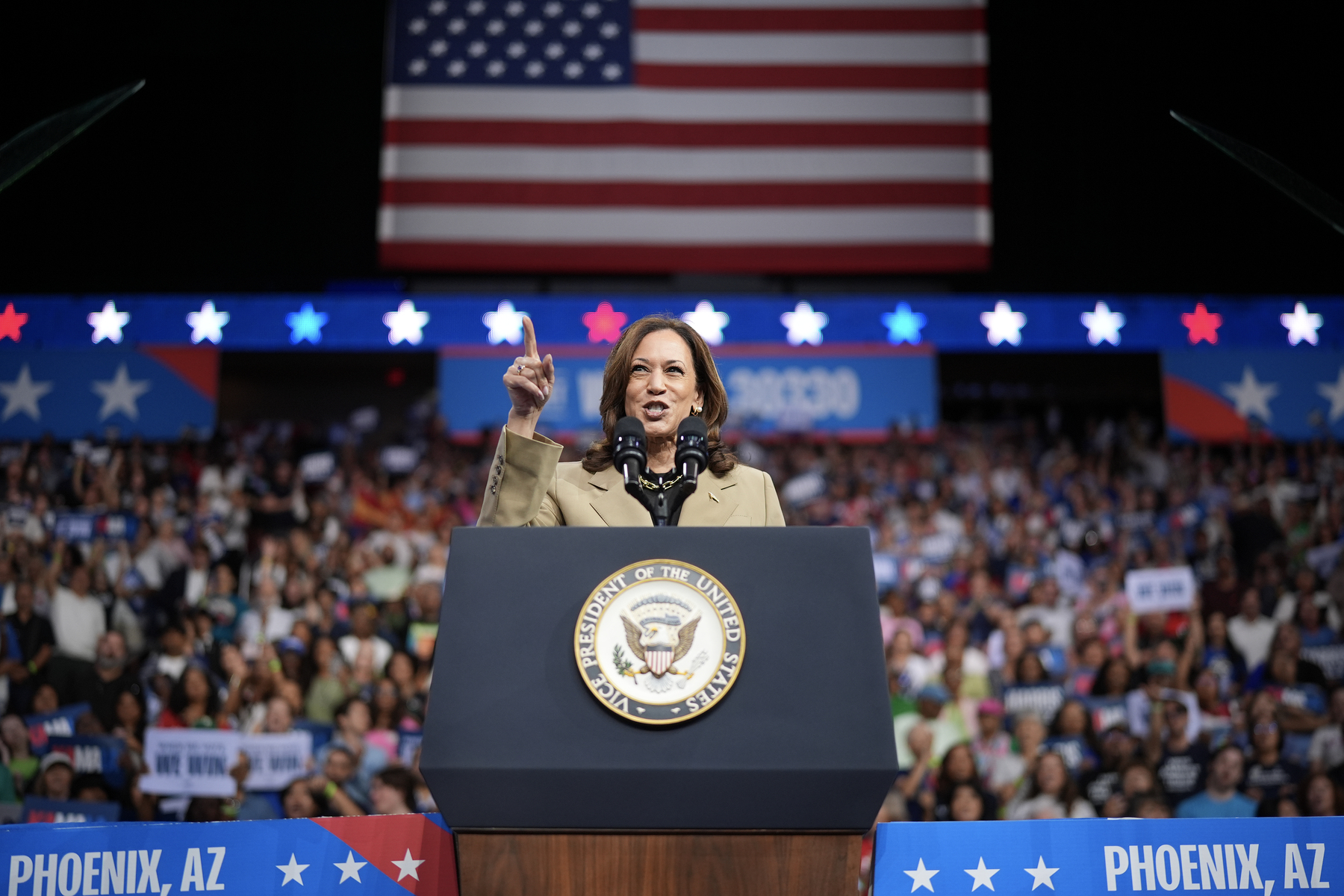Your trusted source for contextualizing Election 2024 news. Sign up for our daily newsletter.
Vice President Kamala Harris’ presidential campaign is only a few weeks old, launching when President Joe Biden said on July 21 that he would not run for reelection.
She has rolled out some policy proposals — including an extended child tax credit — but she has not yet announced detailed plans on a number of key areas of policy.
As the Democratic National Convention kicks off in Chicago, The 19th has pulled together what we know about where Harris stands on key issues, based on what she’s done while vice president and what she’s said during her run.
Abortion | Economy | LGBTQ+ | Child care | Disability and aging | Education | Climate | Criminal justice
Abortion
Harris has made reproductive rights — and abortion specifically — a focus of her campaign. As vice president, she toured the country speaking about the impact of overturning Roe v. Wade. In March, she became the first sitting president or vice president to visit an abortion clinic. And as attorney general in California, she fought to tighten the regulation of anti-abortion centers, the facilities that seek to discourage people from getting abortions.
On the campaign trail, Harris has said she would fight to protect abortion rights, a stance that would require working with Congress to codify federal protections such as those that existed under Roe v. Wade. Roe allowed for restrictions on abortion after fetal viability, which typically occurs between 23 and 25 weeks. Democrats have not had enough votes in Congress to pass such protections under Biden.
Harris has also said she would defend the right to contraception and fertility services like in vitro fertilization, which have both emerged as new targets for some sectors of the anti-abortion movement. Her campaign hasn’t clarified how she would do that.
Economy
Harris’ economic plan will center on lowering costs for Americans after years of blistering inflation, which has cooled lately but still has left many voters disillusioned with the state of the economy.
Rising food prices have been an area of particular concern, especially for women who are often making those purchases on behalf of their families. To combat excessive hikes, Harris is proposing the first-ever federal ban on price gouging for food and groceries, plus new enforcement muscle for the Federal Trade Commission and state attorneys general to go after companies that run up prices.
She is also turning her attention to another pain point: housing costs. Her plan calls for 3 million new affordable housing units built over the next four years and a first-of-its-kind tax incentive to homebuilders that build starter homes sold to first-time home buyers. Those buyers would also receive up to $25,000 in down payment assistance if they can show they’ve been paying their rent on time for two years.
To take on medical debt, Harris is proposing a $35 cap on insulin and a $2,000 cap on out-of-pocket prescription drug costs for all Americans. (The Biden administration has already placed these caps for seniors.) Her administration would also look to cancel medical debt, but it’s still unclear how she plans to implement that change.
LGBTQ+
LGBTQ+ community advocates have largely praised Harris’ record.
She boasts what is believed to be the earliest on-record support for marriage equality of a major party presidential candidate, having officiated same-sex weddings in 2004. As San Francisco district attorney in 2008, Harris refused to defend Proposition 8, which barred marriage equality in California.
Still, Harris has faced criticism for her history as a prosecutor. In 2015 as California attorney general, her office resisted providing gender-affirming care to an incarcerated trans woman. Harris later apologized. She has the endorsement of the nation’s largest trans rights organization, Advocates for Trans Equality.
Child care
In her time in both the Senate and the White House, Harris has been a vocal advocate for caregiving and caregivers, a position inspired by being raised by a single mom with the help of a “second mother,” a neighbor who was a child care worker.
As vice president, Harris has worked behind the scenes pushing for additional government funding for the child care sector. She was the face of the Biden administration’s initiative to lower child care costs for low-income families.
When she ran in the Democratic presidential primary in 2019, she proposed a six-month federal paid leave policy that remains one of the most generous proposals put forward by Democrats. The United States is one of a handful of nations — and the only industrialized one — that doesn’t have such a policy.
As part of her economic agenda, Harris is proposing reinstating the child tax credit to as much as $3,600, the amount that was in place temporarily in 2021 in response to the pandemic. Additionally, Harris wants to introduce a new tax credit available during the first year of a child’s life, when expenses are highest, of up to $6,000 for middle- and low-income families.
Disability and aging
Historically, Harris has been an ally to disability, aging and caregiving communities. This week, her campaign hired a disability community engagement director, Anastasia Somoza, a longtime disability advocate who gave a speech at the Democratic National Convention in 2016.
As a senator, Harris introduced the Domestic Workers Bill of Rights, which would improve working conditions for some paid caregivers, including those supporting disabled and older adults in their own homes.
During her Democratic primary campaign for president in 2020, Harris released the first disability policy plan of the cycle, proposing expansion of home care, as well as increased flexibility for disabled and older adults to choose their own paid caregivers, including family.
Education
Throughout her political career, Harris has strived to make college accessible to all students. As California’s attorney general in 2013, she sued Corinthian Colleges for defrauding students. Nine years later, the Biden-Harris administration discharged the loans of former Corinthian students. In July, Harris juxtaposed her record with former President Donald Trump’s. “I took on one of our country’s largest for-profit colleges that was scamming students. Well, Donald Trump ran a for-profit college that scammed students,” she said, referring to the now-defunct Trump University.
She influenced the broad student loan forgiveness offered by the Biden-Harris administration in 2022, but the Supreme Court blocked the plan. The Biden-Harris administration has prioritized recipients of Pell Grants, offering loan forgiveness and increasing the grant amount as college costs rise, but has not gone as far as her 2020 campaign promise to relieve all of their debts. She has not yet released a proposal during this run.
A Howard University alum, Harris has seen the Biden-Harris administration invest record funding in HBCUs.

Climate
As vice president, Harris cast the tie-breaking vote for the Inflation Reduction Act, the largest piece of climate legislation passed in U.S. history. Last year, she was also the highest-ranking U.S. official to attend the annual global climate summit COP 28 in Dubai.
As a U.S. senator, she was known for her attempts to pass climate-related legislation. She introduced the Water Justice Act in 2019, which would have reduced water bills and funded lead testing in schools and low-income communities. In 2020, she introduced the Climate Equity Act, which would have measured the effect environmental laws had on communities disproportionately affected by climate change.
She was also a co-sponsor of the Green New Deal, a congressional resolution pushed by young progressives that called for creating well-paying clean energy jobs, and sponsored the Environmental Justice for All Act, which would have helped communities disproportionately burdened by pollution and industry. While none of these bills became law, these efforts have earned her endorsements from a group of 350 environmental advocates and policymakers and groups like the Green New Deal Network, which had declined to endorse Biden.
Criminal justice
Harris has repeatedly championed alternatives to incarceration for people convicted of nonviolent crimes, but has also encouraged a “lock ’em up” mentality for those convicted of violent crimes, which has received criticism from advocates in the criminal justice space. While district attorney of San Francisco, one of her signature efforts was the “back on track” initiative to reduce recidivism among young adults charged with nonviolent offenses, which included job training and placement, assistance with education, and mental health services.
As district attorney, Harris vowed to “never charge the death penalty.” However, as attorney general of California, she appealed a court ruling in 2014 that would have effectively ended capital punishment in California, stating that the ruling was “not supported by the law.”
While in the U.S. Senate, Harris supported a number of criminal justice reform bills. She introduced the Pretrial Integrity and Safety Act of 2017 to replace the use of money bail in pre-trial detention; the bill never came to a vote. In 2019, she introduced the Ensuring Quality Access to Legal Defense Act, which sought to award grants to invest in state, local and tribal public defenders’ offices.
Candice Norwood, Chabeli Carrazana, Jessica Kutz, Kate Sosin, Nadra Nittle, Sara Luterman, Shefali Luthra and Terri Rupar contributed reporting.
To check your voter registration status or to get more information about registering to vote, text 19thnews to 26797.




